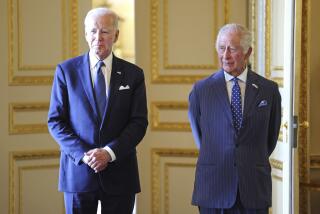Thatcher Optimistic on Arms Agreements : Diplomacy: The British leader visits President Bush at Camp David.
- Share via
WASHINGTON — British Prime Minister Margaret Thatcher foresees a “good chance” that agreements will be reached next year with the Soviet Union on reducing conventional forces in Europe and cutting back on strategic nuclear weapons.
However, the West’s watchwords should be “don’t disarm too fast,” Thatcher said Friday after a four-hour meeting with President Bush. She said it would take “a long time” after 1990 to carry out and verify any East-West agreement on troop strength and nuclear arsenals.
The White House said in a statement after the talks that the two leaders were in “very close accord” on the subjects they discussed.
“They both emphasized the pursuit of democracy as the first step in the reform process,” White House Press Secretary Marlin Fitzwater said after the meeting at the President’s mountain retreat at snow-covered Camp David, Md.
Thatcher and Bush focused on Eastern Europe, East-West relations and other global issues, including China, Cambodia, the Middle East and Central America. Bush also summarized plans for his shipboard summit off Malta with Soviet President Mikhail S. Gorbachev next week.
Even as they met, news was flashed from Prague of the resignation of the Czechoslovak Communist Party Politburo after days of mass demonstrations demanding new leadership.
“We in the West have great hopes that Czechoslovakia also will become a democracy,” Thatcher said. But she cautioned: “The wish is not the deed.”
Establishment of democratic processes, including secret-ballot elections and an independent judiciary, would take far longer than the dramatic toppling of Communist regimes, she said.
Discussing the East-West negotiations on reduction of Conventional Forces in Europe (CFE) now under way in Vienna, Thatcher said chances for early agreement would be enhanced if a thorny dispute over aircraft could be put aside for the time being.
The North Atlantic Treaty Organization wants to include in negotiations all planes capable of carrying weapons, while the Soviets want to exempt a large class of what they consider to be defensive planes.
Although she prefers not to postpone the airpower issue, Thatcher said, it should not be allowed to block agreement on such topics as the number of combat troops and types of weapons deployed by NATO and Warsaw Pact nations in Europe.
American analysts have said the aircraft issue is a “sticky wicket” in the CFE talks. Removing it from the bargaining table, they said, could help speed an agreement that Gorbachev seems to want very much.
Thatcher argued that the speed of political change in Poland, Hungary and Czechoslovakia does not warrant dismantling of NATO. “Every single step (in arms control) has to be agreed with the Soviet Union so neither their security nor our security is jeopardized,” she said.
Speaking of Bush’s scheduled talk with Gorbachev on Dec. 2-3, she said she did not expect any problems or any major surprise announcements to emerge from the Malta summit.
She apparently told the U.S. President of her view that Gorbachev is in a strong position at home despite a troubled economy and an upsurge in nationalist and secessionist sentiment in five of the 15 Soviet republics.
“I think he (Gorbachev) is very firmly in the saddle,” Thatcher told reporters, noting that she has met with the Soviet leader six times during his 5 1/2 years in power. “I don’t see any rival.”
“Greater realism” exists inside the Soviet Union about the enormous task of achieving economic reform on the heels of political changes toward greater openness and an elected legislature, she said.
Thatcher’s visit was part of Bush’s process of consultation with major European allies. He held talks last week with West German Foreign Minister Hans-Dietrich Genscher, and the White House announced that the President would meet with French President Francois Mitterrand on Dec. 16 somewhere in the Caribbean.
On a hotly controversial issue, Thatcher said most of an estimated 40,000 Vietnamese “boat people” in Hong Kong may be sent back to their homeland as illegal immigrants. She said that about 13,000 of the total were “genuine refugees” and would be allowed to remain in the British Crown Colony.
Outside the hotel where she held the news conference, about two dozen demonstrators shouted “No forced repatriation!” and carried banners describing forced return of the “boat people” to Vietnam as a “Detour to Hell.”
More to Read
Sign up for Essential California
The most important California stories and recommendations in your inbox every morning.
You may occasionally receive promotional content from the Los Angeles Times.










